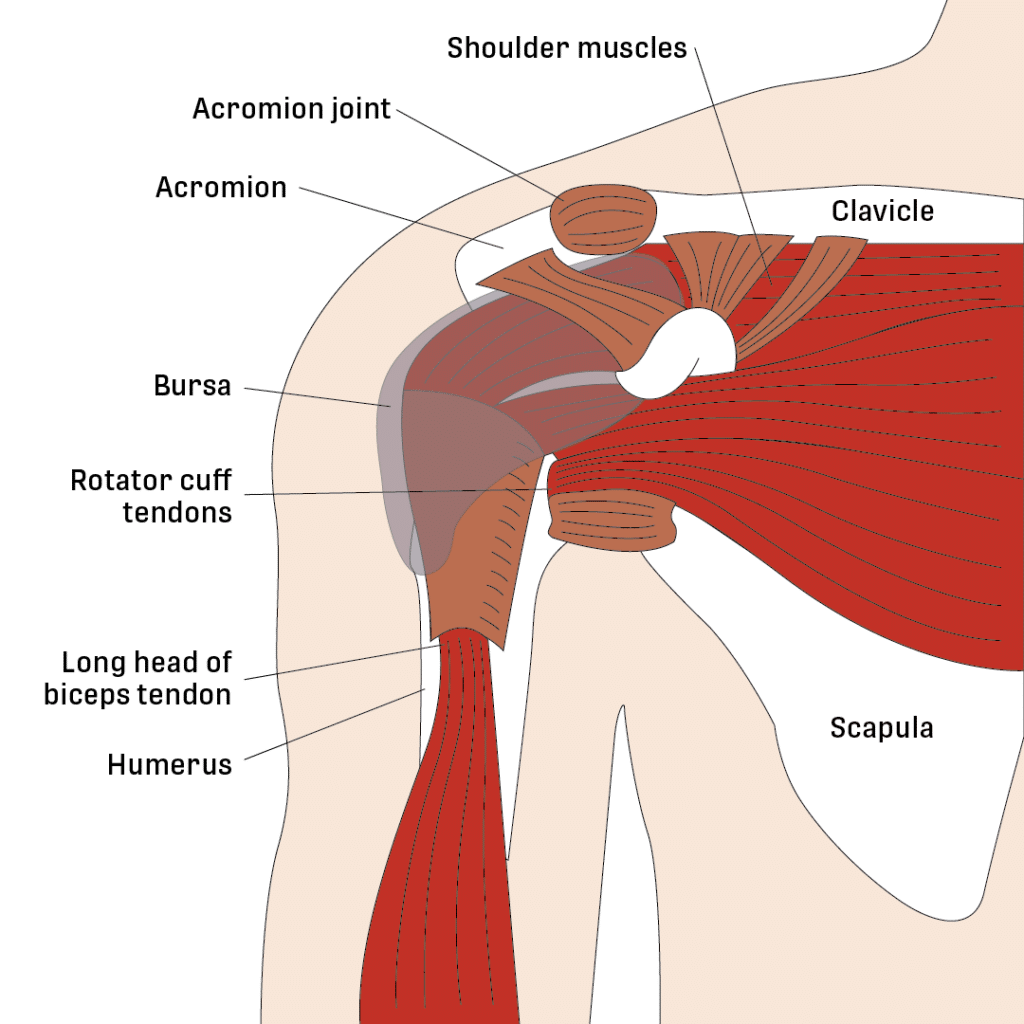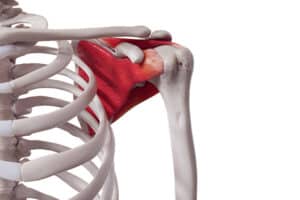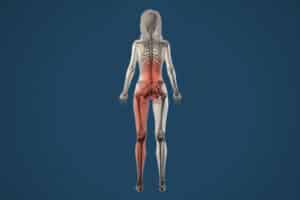Shoulder pain is a common complaint that we hear about at our physio clinic from our patients. Since so many different structures make up the shoulder, it is susceptible to many different problems including shoulder impingement. To understand shoulder impingement, we first need to describe for you what makes up a shoulder.
Anatomy of the shoulder
The shoulder is made up of three bones: the scapula (shoulder blade), clavicle (collarbone) and humerus (upper arm bone), as well as several joints combined with tendons and muscles that allow a great range of motion in your arm.
The acromion is top outer edge of your shoulder blade.
A bursa is a tiny, slippery sac of fluid that provides a cushion and reduces friction between the surfaces of a bone and soft tissue.
And the rotator cuff is a group of muscles and tendons that surround the shoulder joint.
The rotator cuff is a frequent source of pain in the shoulder.

What is Shoulder Impingement?
Shoulder impingement is one of the most common causes of shoulder pain. Shoulder impingement occurs when the acromion rubs against or pinches your rotator cuff beneath it, causing pain and irritation.
What are the symptoms of shoulder impingement?
Symptoms usually develop gradually over weeks to months.
Symptoms of shoulder impingement:
- Pain in the top and outer side of your shoulder.
- Pain and tenderness in the front of your shoulder.
- Pain when performing overhead lifting with your arm, lowering your arm from a raised position, lifting your arm, or when reaching.
- Pain when lying on the affected shoulder.
- Pain or aching at night, which can affect your sleep.
- Weakness in your arm or shoulder.
Shoulder impingement is closely related to other common sources of pain in the shoulder called:
Bursitis – Bursitis occurs when the bursa becomes inflamed.
Rotator cuff tendonitis – Pain and swelling of the rotator cuff tendons and the surrounding bursa.
You can experience these conditions on their own or in combination.
The Causes of Shoulder Impingement
Shoulder impingement is a common cause of shoulder pain. Some of the common causes are listed below.
Overuse of the shoulder – There are numerous activities and sports that require repetitive lifting or overhead movements that can cause shoulder impingement. Swimming, baseball, tennis, painting, and construction are all examples. Repeating the same movement over and over can cause fatigue and result in pinching of the rotator cuff.
Trauma to the shoulder – Pain may also develop as the result of a minor injury. Accidents happen and it may involve a direct impact to the shoulder. A torn shoulder or rotator cuff muscle can lead to shoulder impingement.
Poor shoulder mechanism – The shoulder is a complex body part that involves many parts for it to move. Each part plays an important role to make sure that the movement is fluid. Any disruptions to these individual parts can result in shoulder impingement.
Poor posture spinal posture – Posture plays a vital role in shoulder movement. Poor posture most commonly implies rounding of your shoulders and spine. This can put the shoulder blade in a poor position to rotate and can play a role in shoulder impingement when raising the arm above the head.

Shoulder Impingement Treatment
Physiotherapy – Physiotherapy is an essential treatment to help with pain management, restoring range of motion, and re-strengthening your shoulder. Your physiotherapist with develop a treatment plan for you that includes a combination of hands-on therapy, exercises to be completed, and educating you on how to prevent this injury in the future.
Rest – The best remedy is going to be resting your shoulder from any and all activities that are causing you pain. This includes sports, recreational activities, and work tasks.
Ice – To help reduce the inflammation, it is recommended to ice your shoulder. This will help to ease the pain that you are experiencing as well.
Medication – Anti-inflammatory medicines such as ibuprofen will help reduce inflammation, while acetaminophen can help reduce the pain.
Cortisone injection – When oral medication is not sufficient to cope with the pain and inflammation, your family doctor may recommend a cortisone injection. The corticosteroid medication may improve your shoulder pain and range of motion temporarily. Sometimes steroids can give permanent relief. Most often this is not a permanent solution however as it does not address the underlying root cause.
Surgery – You may need to seek advice from an orthopedic specialist/surgeon. After thorough examinations, it may be determined that a structural abnormality is the cause of the shoulder impingement. If this is the case, then surgical intervention may be recommended.
Shoulder Impingement FAQs
How is shoulder impingement diagnosed?
Your family doctor or physiotherapist can diagnose shoulder impingement. A complete medical history and a physical exam followed by x-rays will be completed. The x-rays are a tool used to rule out other conditions such as arthritis or injury to the muscle.
Can MRI detect shoulder impingement?
Magnetic Resonance Imaging (MRI) of the shoulder can be used to diagnose arthritis, fractures, rotator cuff disorders, including tears and impingement of the shoulder.
What is the fastest way to heal a shoulder impingement?
Recommended treatments for shoulder impingement include resting the shoulder, icing the shoulder, anti-inflammatory medications, steroid injections, and physiotherapy.
Will massage help shoulder impingement?
Deep tissue massage techniques can reduce compression and allow more space for the shoulder joint to move freely and not impinge.
What exercises will help with shoulder impingement?
We have included a link to a resource to therapeutic stretching exercises that might help you.
To ensure that this program is safe and effective for you, it should be performed under your doctor’s supervision. Talk to your doctor or physiotherapist about which exercises will best help you meet your rehabilitation goals.








